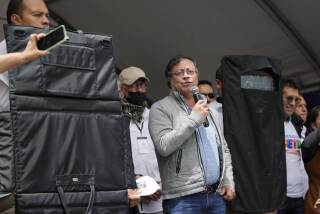Rights Panel Demands Colombia Prosecute Its Soldiers, Sources Say : Massacre: OAS group wants compensation for survivors. Country’s president has admitted army troops killed more than 100 peasants in two-year reign of terror.
- Share via
WASHINGTON — The Inter-American Human Rights Commission, in a report to be issued this week, will demand that the government of Colombia prosecute soldiers accused of a two-year reign of terror in which more than 100 peasants were killed, some of them beheaded with chain saws, according to human rights sources.
The commission, an arm of the Organization of American States, reportedly commended Colombian President Ernesto Samper for acknowledging the massacre in the village of Trujillo but called on the government to punish the perpetrators, compensate the victims and find out how the crime was covered up for five years.
The commission, which meets twice a year, is expected to assess the government’s handling of the case when it meets again in September.
Samper admitted that the Colombian army was implicated in serious human rights violations. The admission came last month when he made public the report of a government-private committee that investigated killings in Trujillo between 1988 and 1990. The panel documented the chain-saw massacre of 34 people in a single incident and said that the toll for the entire period reached 107.
Samper took office last August. His predecessor, Cesar Gaviria, is now OAS secretary general.
“This action taken by President Samper is remarkable. It has no precedent in Colombia,” said Jose Miguel Vivanco, executive director of Human Rights Watch-Americas. “But even at the present time, serious human rights violations are going on in Colombia.”
Vivanco said that Human Rights Watch is pressing several other cases against Colombia before the OAS commission. The government has not admitted guilt in any of the other matters, he said.
Javier Giraldo, a Colombian priest, filed the original complaint with the OAS rights panel last year. At the commission’s urging, the government ordered the investigation. Vivanco, whose organization helped Giraldo press the case, said it was the first time that Colombia had conducted an impartial investigation of human rights violations by its army.
The Colombian report is highly critical of the nation’s judicial system for permitting the cover-up. The panel said that a fruit picker who witnessed the beheadings reported them in 1990. Instead of trying to prosecute the killers, however, authorities sent the witness, Daniel Arcila, to a mental hospital, claiming that he was a paranoid psychopath.
According to the report, the beheadings were carried out by a detachment commanded by Lt. Col. Alirio Antonio Uruena, who was a major at the time of the killings. Samper ousted Uruena from the army after receiving the report, but the government has not acted to bring him to trial.
“Until a week ago, Uruena was a serving member of the army,” Vivanco said. “He was tried (for human rights violations) twice before, and twice he was acquitted. This shows the quality of the judicial investigation.”
Vivanco said it is not yet clear what will happen to Uruena or to the other soldiers involved in the case. He said that Samper dissolved the investigative committee after receiving its report.
The commission related the chilling testimony of torture--by forcing water down victims’ throats--and death that had been discounted as madness by the judiciary.
“They were blindfolded . . . and put into large coffee sacks,” said Arcila, the witness.
“Later, Major Uruena took a 2-inch hose, and the first he put it to was a 55-year-old lady, who began to shout: ‘Don’t you have children? For holy God’s sake, what are you going to do to me?’
“The major repeated the same torture with everyone. Then he told one of the paramilitaries to get a chain saw. Then he cut off their heads . . . and later cut everyone into pieces.”
More to Read
Sign up for Essential California
The most important California stories and recommendations in your inbox every morning.
You may occasionally receive promotional content from the Los Angeles Times.













